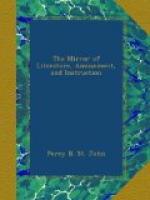“On going up stairs to the room which the devil had honoured with his presence, the landlord found that his infernal majesty had helped himself to every thing he could lay his hands upon, having broken into his desk and carried off twenty-five guineas of king’s money, a ten pound Bank of England note, and sundry articles, such as seals, snuff-boxes, &c. Since that time he has not been seen in these quarters, and if he should, he will do well to beware of Doctor Poundtext, who is a civil magistrate as well as a minister, and who, instead of exorcising him to the bottom of the Red Sea, may perhaps exorcise him to the interior of Leicester gaol, to await his trial before the judges of the midland circuit.”
Next is the Omen, by Mr. Galt, a powerful sketch. Affixed to St. Feinah’s Tree, a Legend of Loch Neagh, we notice the signature of an esteemed correspondent, (M.L.B.) whose taste and ingenuity entitle her to high rank among the contributors to the present work. Kemp, the Bandit, by Delta, is an interesting tale; Life and Shade, a Portuguese Sketch, by Mrs. M. Baillie, is in her best narrative style; and Seeking the Houdy, by the Ettrick Shepherd, is in his happiest familiar vein. The curiosity of the volume, and indeed, the only poetical contribution we have room to notice, is the following lines of Lord Byron, written in his boyhood, to “Mary,” (Mrs. Musters,) about a year before her marriage:—
Adieu to sweet Mary for ever;
From her I must quickly depart;
Though the Fates us from each other sever,
Still her image will dwell
in my heart.
The flame that within my heart burns,
Is unlike what in lovers hearts
glows;
The love which for Mary I feel,
Is far purer than Cupid bestows.
I wish not your peace to disturb,
I wish not your joys to molest,
Mistake not my passion for Love,
’Tis your friendship
alone I request.
Not ten thousand lovers could feel
The friendship my bosom contains;
It will ever within my heart dwell,
While the warm blood flows
through my veins.
May the ruler of heaven look down,
And my Mary from evil defend;
Mny she ne’er know adversity’s
frown,
May her happiness ne’er
have an end.
Once more, my sweet Mary, adieu;
Farewell; I with anguish repeat,
For ever I’ll think upon you,
While this heart in my bosom
shall beat.
The Editor has subjoined a note, explaining his reason for printing these “schoolboy rhymes,” which, of course, is not for their literary merit; still, in comparison with many of Lord Byron’s after productions, what the present want of head, others lack of heart, and this is a home truth which his warmest admirers must acknowledge.




